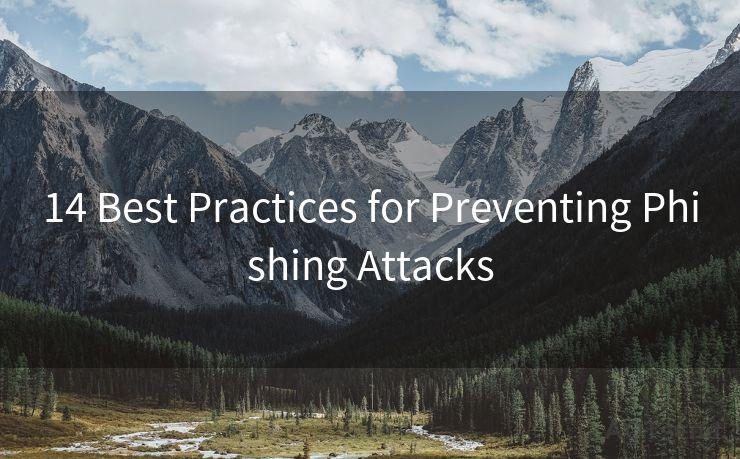14 Best Practices for Preventing Phishing Attacks




In the digital age, phishing attacks have become increasingly common, making it crucial to understand how to protect yourself from these malicious attempts. Here are 14 best practices to help you prevent phishing attacks and keep your personal information safe.
1. Recognize Phishing Emails
The first step in preventing phishing attacks is to learn how to recognize them. Phishing emails often contain urgent language, asking for sensitive information such as passwords or credit card details. Always be suspicious of unsolicited emails that request personal information.

2. Use Strong Passwords
Creating a strong and unique password for each account can significantly reduce the risk of phishing attacks. Make sure to use a combination of uppercase letters, lowercase letters, numbers, and special characters.
🔔🔔🔔
【AOTsend Email API】:AOTsend is a Managed Email Service for sending transactional emails. Support Email Types: reminders, authentication, confirmations, notifications, verification codes, invoices, password resets, account activations, billing statements, two-factor authentication (2FA), and one-time passwords (OTP) emails, etc. $0.28 per 1000 Emails. 99% Delivery, 98% Inbox Rate.
You might be interested in:
Why did we start the AOTsend project, Brand Story?
What is a Managed Email API, How it Works?
Best 25+ Email Marketing Platforms (Authority,Keywords&Traffic Comparison)
Best 24+ Email Marketing Service (Price, Pros&Cons Comparison)
Email APIs vs SMTP: How they Works, Any Difference?
3. Enable Two-Factor Authentication
Two-factor authentication adds another layer of security to your accounts. Even if your password is stolen, attackers still need the second factor (usually a code sent to your phone) to access your account.
4. Keep Software Updated
Regularly updating your software, including your operating system, web browser, and antivirus program, ensures that you have the latest security patches and reduces the risk of exploits.
5. Avoid Clicking Suspicious Links
Never click on links in unsolicited emails, even if they appear to come from a trusted source. Hover over links to check the URL before clicking, and only click if you are sure it's safe.
6. Use Secure Connections
Always ensure that you are using a secure connection (HTTPS) when entering sensitive information online. This encrypts the data transmitted between your device and the server, reducing the risk of interception.
7. Beware of Pop-Ups
Be cautious of pop-up windows asking for personal information. These are often phishing attempts designed to steal your data.
8. Educate Yourself and Others
Stay informed about the latest phishing techniques and share this knowledge with your friends and family. Education is key to preventing these attacks.
9. Use Anti-Phishing Toolbars
Consider installing anti-phishing toolbars in your web browser. These toolbars can help identify and block known phishing sites.
10. Verify the Sender
Always verify the sender of an email before responding, especially if it requests sensitive information. Phishers often spoof email addresses to make them look legitimate.
11. Ignore Unsolicited Attachments
Never open unsolicited attachments in emails, as they may contain malware or viruses designed to steal your information.
12. Use a Firewall
Installing a firewall on your computer or network can help block unauthorized access and protect your information.
13. Backup Your Data
Regularly backing up your data ensures that even if your information is compromised, you have a recent copy to restore from.
14. Report Phishing Attempts
If you receive a phishing email, report it to the relevant authorities. This helps them track and shut down phishing operations.
By following these 14 best practices, you can significantly reduce the risk of falling victim to a phishing attack. Remember, prevention is always better than cure, so stay vigilant and protect your personal information.




Scan the QR code to access on your mobile device.
Copyright notice: This article is published by AotSend. Reproduction requires attribution.
Article Link:https://www.mailwot.com/p737.html



